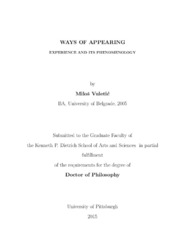| dc.contributor | Gupta, Anil | |
| dc.contributor | McDowell, John | |
| dc.contributor | Schafer, Karl | |
| dc.contributor | Machamer, Peter | |
| dc.creator | Vuletić, Miloš | |
| dc.date.accessioned | 2022-05-18T13:42:29Z | |
| dc.date.available | 2022-05-18T13:42:29Z | |
| dc.date.issued | 2015 | |
| dc.identifier.uri | http://reff.f.bg.ac.rs/handle/123456789/3631 | |
| dc.description.abstract | Perceptual experience is an invaluable guide to our cognition of the world: (i) experience helps make thoughts about mind-independent objects possible, and (ii) experience helps make thoughts about mind-independent objects reasonable. My dissertation aims to answer the question: how should we account for experience if we are to do justice to its rational role in cognition? I argue that neither of the two dominant contemporary models of experience is satisfactory: experience as representation and experience as acquaintance. Experience should be understood as a matter of various items being present to the experiencing subject. Crucially, I propose an account of perceptual error in terms of the presence of unreal sense-images (in hallucination) and presentational tropes (in illusion). First I argue against treating experience as a representational state. I show that such treatments require a strong relation to obtain between experience and content; I argue that the strong relation cannot be sustained. I show, in particular, that experience is not best understood as a state in which properties are attributed to objects or in which concepts are employed. Experience should instead be treated as a matter of a relation of subjects to objects and their properties. Next, I argue against the acquaintance-based relational approaches to experience. These accounts do not treat illusion plausibly; they cannot sustain two basic facts: that an object can exhibit different appearances and that different objects can exhibit identical appearances. In response to this problem, I posit a weaker perceptual relation: in experience certain items are present to the subject. Presence does not entail knowledge of items present.
Finally, I offer an improved relationalist approach to perceptual error. I endorse the idea that in hallucination there are items—unreal sense-images—present to the subject. However, I reject the proposal to treat illusions in the same way: presence of sense-images in illusion makes the presence of misperceived objects redundant. Instead, I propose that presentational tropes are present in illusion. Presentational tropes are relational particulars that require both a subject and an experienced object for their existence. | sr |
| dc.language.iso | en | sr |
| dc.rights | openAccess | sr |
| dc.rights.uri | https://creativecommons.org/licenses/by-nc/4.0/ | |
| dc.source | http://d-scholarship.pitt.edu/24799/ | sr |
| dc.title | Ways of Appearing: Experience and Its Phenomenology | sr |
| dc.type | doctoralThesis | sr |
| dc.rights.license | BY-NC | |
| dc.identifier.fulltext | http://reff.f.bg.ac.rs/bitstream/id/8386/Ways_of_Appearing--Final.pdf | |
| dc.identifier.rcub | https://hdl.handle.net/21.15107/rcub_reff_3631 | |
| dc.type.version | publishedVersion | sr |

